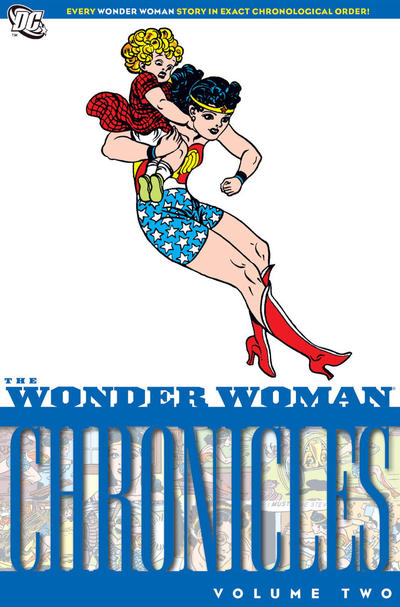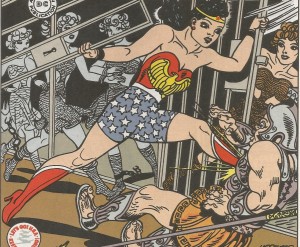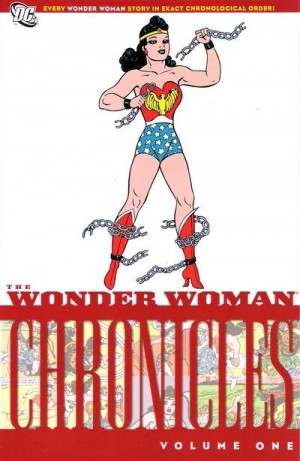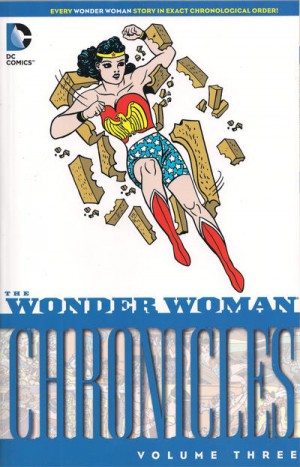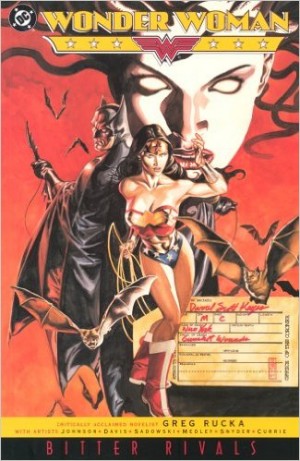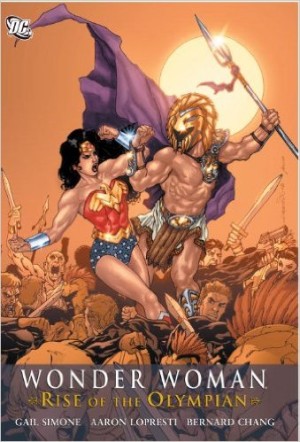Review by Will Morgan
Continuing the chronological representation of all Wonder Woman’s 1940s adventures, this volume addresses an error in the hardcover Archives editions, which omitted the stories from Comics Cavalcade, the third title (after Sensation Comics and Wonder Woman) to run new adventures of the Princess of Power. Thus the Chronicles become the only complete and authoritative source, despite the Archives’ seniority and higher numbers.
After a bravura start with the first volume, creators William Moulton Marston and Harry G. Peter, under the joint pseudonym of “Charles Moulton”, cram so much into this succession of stories that the series is in danger of losing focus. The feminist agenda at the heart of Wonder Woman continues to be exploited and explored, as do themes of rehabilitation and the exercise and abuse of power, physical and otherwise. However, the valid points Marston attempts to make about the exercise of power are largely submerged under a bombardment of increasingly elaborate and lovingly-detailed bondage imagery. It cannot be denied that Marston, from biographical evidence presented elsewhere, had more agendas and interests than the explicitly feminist.
Even at the time, concern was expressed by editorial figures at DC about the bondage imagery, especially the use of chains and ropes by “good” characters against other “good” characters, for apparently recreational purposes, and as a “rehabilitation” technique. There were also qualms about the fan mail Wonder Woman was receiving from young men who dwelt extensively on the tied-up and restrained figures of our heroine and her nubile female foes. While Marston’s conviction about the natural superiority of women was sincere and evident, there were many instances when, as it were, the subtext became the text, and the struggles of the women – before they invariably ‘liberated’ themselves – were far more explicitly detailed than necessary for dramatic purposes.
The fact remained, however, that Wonder Woman’s comics sold. And sold, and sold. Some credible sources cite her circulation as matching or exceeding the sales juggernauts Superman and Batman, and as long as the cash kept rolling in, concerned parents groups and nervous editors could apparently be ignored.
Of the stories in this volume, most are hard-core Nazi-bashing – with two odd dips into sentimentality, a Christmas story narrated by a fir tree (!), and a follow-up tale telling how Wonder Woman – who, after all, is not a Christian – spends the holidays at home with the Paradise Island Amazons celebrating “Diana’s Day”. This involves dressing up young girls as game animals, tying them up, and baking them (non-fatally) in fake pie crusts. No, it’s okay, go back and re-read that; it makes no more sense the second time, guaranteed. There’s also the introduction of the viciously misogynistic Dr. Psycho.
More satisfying are two longer stories, in which Mars, God of War and, handily, ruler of the eponymous planet, sends his adjutants, Lord Conquest, the Earl of Greed, and the Duke of Deception, to ally with and inspire the Axis powers. The depiction of Hitler as under the influence of the war god smacks, in these times, of excuse-making, but that was doubtless not the intention at the time. The elaborate schemes of Mars’ underlings nevertheless make for a page-turner. Of still greater interest is the feature-length run-in with Paula Von Gunther, a previously-established Wonder Woman foe who begins a personal journey over the course of four chapters; yes, there’s a lot of rather prurient dwelling on Paula’s phalanx of slave girls and the methods by which she subdues and re-programmes them, but nevertheless, there’s the start of a virtually unprecedented transformation, elaborated on in stories contained in the next volume.
Short verdict; energetic, but misdirected.
